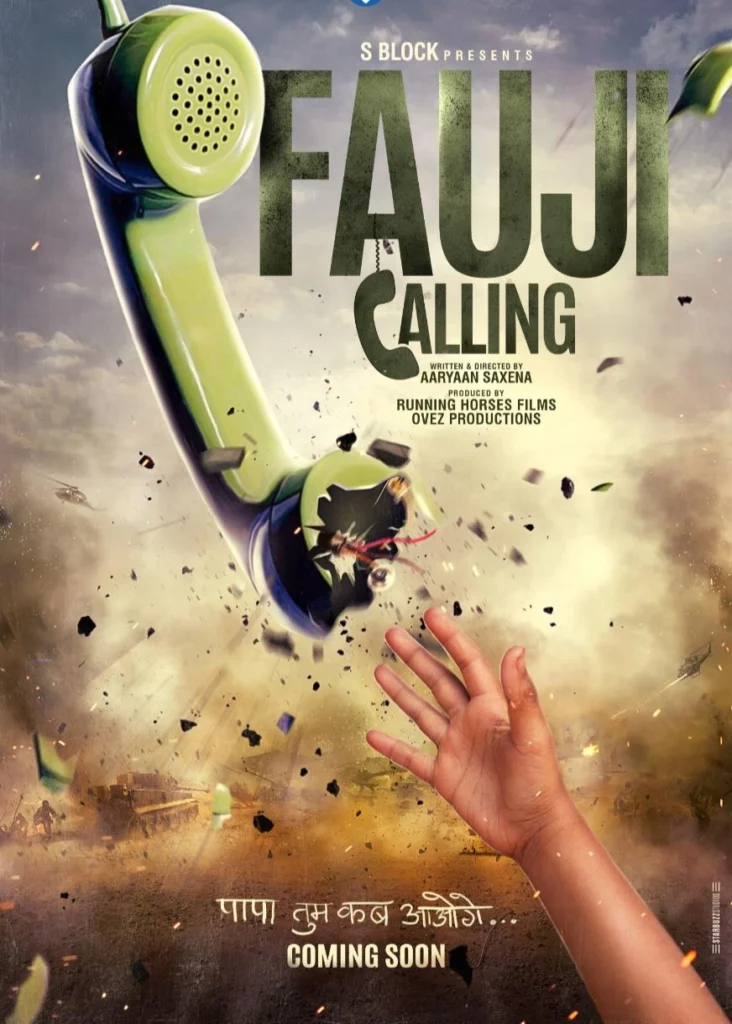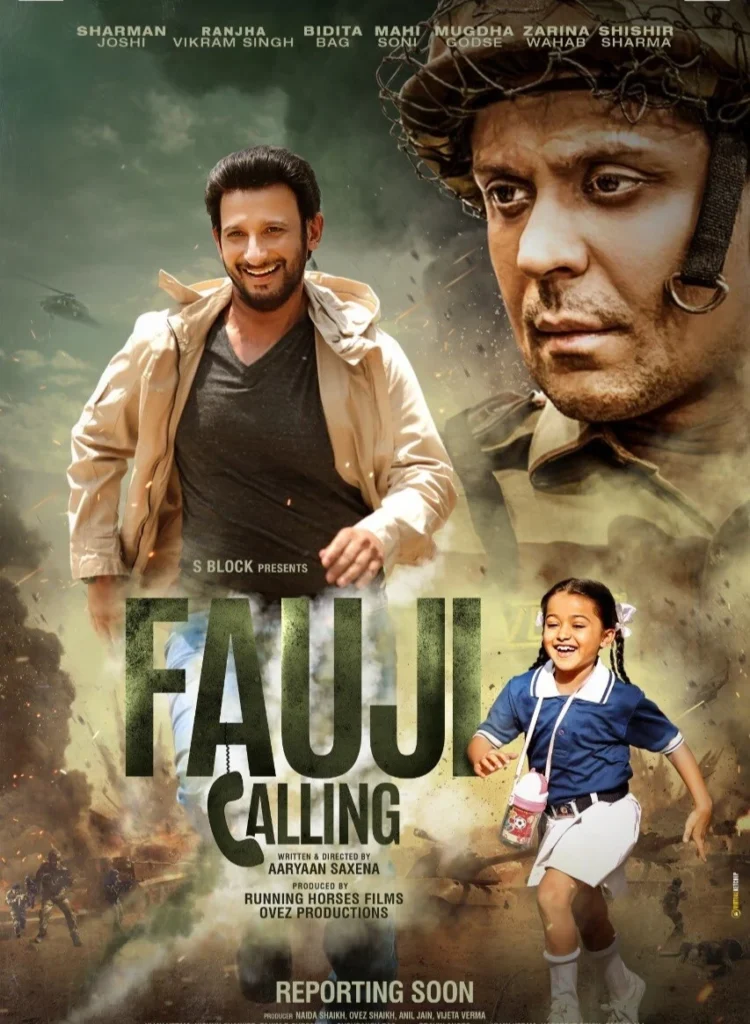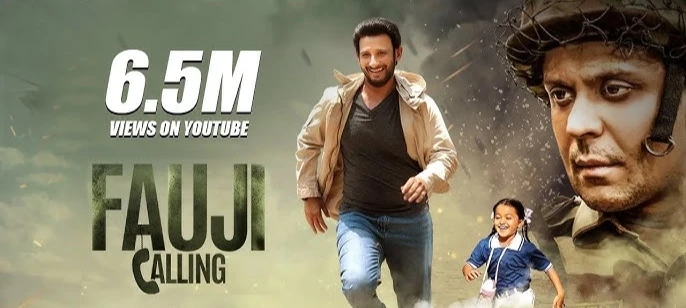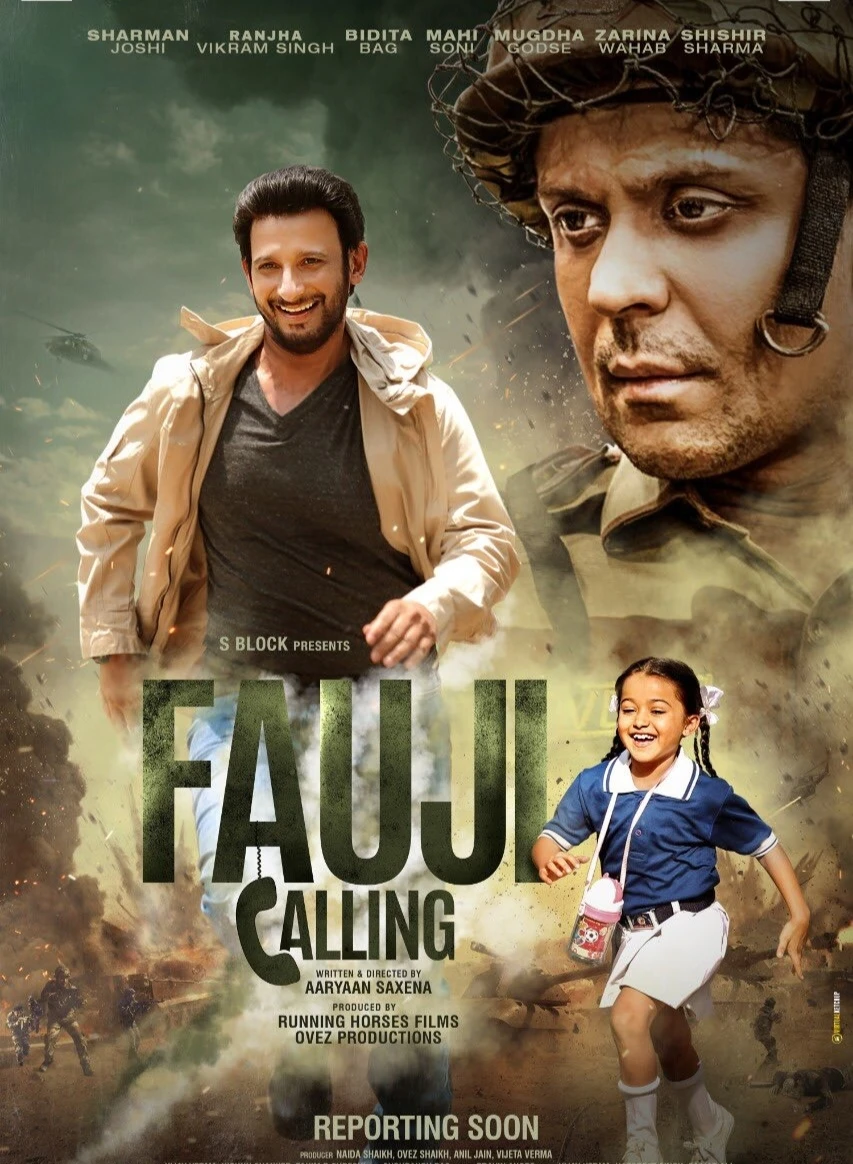Fauji Calling moe is an emotional drama that shifts the spotlight from the battlefield to the homes of soldiers who sacrifice their lives for the nation. Instead of focusing on war action, the film beautifully portrays the struggles, resilience, and silent courage of a martyr’s family. Directed by Aaryaan Saxena, the movie features powerful performances by Sharman Joshi, Bidita Bag, and Zarina Wahab. Through heartfelt storytelling, it reminds audiences that patriotism is not just about soldiers fighting at the frontlines, but also about the families who carry their sacrifice with dignity. This review explores every detail of the film.
🎬 Introduction to Fauji Calling Movie
Fauji Calling is an emotional drama that honors the sacrifice of Indian soldiers and their families, who go through a lot during times of conflict. Released in 2021, this film connected deeply with viewers who admire the selfless service of the armed forces. Unlike many war dramas that focus on battle scenes, Fauji Calling focuses on the personal stories of soldiers’ families. This makes it more than a war movie—it’s a story about love, loss, and strength.
The movie follows the journey of a martyr’s family as they deal with grief while also feeling proud of their loved one’s sacrifice. Through heartfelt dialogues, real characters, and an emotional story, Fauji Calling shows the struggles of widows, children, and parents who quietly fight their own battles. It’s not just a patriotic film but also a touching reminder of the human cost of war.
📝 Storyline and Plot Overview
Fauji Calling tells the story of a soldier who dies in combat and the impact this has on his family. His wife and daughter are left heartbroken, dealing with sorrow and an uncertain future. The daughter struggles to understand why her father is gone, while the mother faces emotional pain and financial challenges.
The film shows how society, government, and personal loss come together in the life of a martyr’s family. Instead of focusing on the battlefield, it highlights the silent battles fought by families at home. The story explores many layers: a child’s innocence, a mother’s bravery, and a nation’s gratitude.
What makes this story stand out is its focus on realism over drama. Every scene feels authentic, whether it’s emotional moments, government support, or communities coming together. This honest storytelling sets it apart from typical Bollywood war dramas.
🎭 Performances and Character Analysis
The performances in Fauji Calling are one of its strongest points. Each actor brings their role to life, making the audience feel their pain and strength. Sharman Joshi gives a sincere performance, playing a common man touched by the sacrifices soldiers make. His natural acting and dialogue delivery add depth to the story.
Bidita Bag, who plays the soldier’s widow, delivers a powerful and emotional performance. Her portrayal of grief and resilience deeply connects with viewers. The child actor playing the daughter brings innocence and heartbreak, earning the audience’s sympathy in every scene.

Ranjha Vikram Singh, Zarina Wahab, and other supporting actors also add depth and realism. None of the characters feel forced or exaggerated; they all come across as real people facing tough challenges. Together, their performances make the film relatable and emotionally moving.
🎥 Direction and Cinematic Vision
Director Aaryaan Saxena handles the subject with care and maturity. Instead of showing grand heroism, he focuses on subtle emotions and realistic struggles. This makes the film more meaningful for viewers looking for authenticity.
The movie’s goal is to connect soldiers on the frontlines with the families who support them. Through carefully made scenes, the director shows both the pride and pain that come with being part of a soldier’s family. He avoids unnecessary glamor and sticks to real stories, making the film a refreshing take on patriotic cinema.
Visually, the film uses close-up shots and natural light to bring out the emotional depth of the performances. The director keeps the movie’s heart intact, never letting it become overly dramatic.
🎶 Music and Background Score
The music in Fauji Calling matches the film’s emotional tone. The songs aren’t just fillers—they express feelings that words sometimes can’t. Soulful tracks like “Tanhaai” and “Maa” pull at the heartstrings, especially for soldiers’ families.
The background score adds to the emotional weight of key scenes without overpowering them. It blends smoothly with the story, keeping viewers engaged and connected. The music helps close the emotional gap between the characters and the audience, making the experience personal.
Music director Daboo Malik deserves praise for creating an album that fits the film’s sensitivity. The combination of touching lyrics and gentle melodies makes the soundtrack memorable, leaving a lasting impact after the movie ends.
🌍 Themes and Messages in Fauji Calling
At its core, Fauji Calling is about sacrifice, strength, and the unseen struggles of soldiers’ families. The film shares important themes that deeply resonate with Indian viewers.
One major theme is the emotional cost of war. While soldiers fight bravely on the borders, their families carry a hidden burden. The film brings this silent truth to light, helping viewers understand the price of freedom.
Another key message is national gratitude. The story stresses the need to support martyr families, not just with money but with emotional care too. It reminds us to show empathy, so grieving families don’t have to face their struggles alone.
The movie also touches on childhood innocence, a mother’s courage, and community unity. By weaving these themes together, Fauji Calling sends a strong social message that goes beyond cinema—it’s a call for compassion and respect for the true heroes of the nation.
K 🖋️ Screenplay and Writing Style
The screenplay of Fauji Calling is one of its strongest points because it focuses on genuine emotions instead of following the usual Bollywood war-drama formula. Written with care, the script skips unnecessary action and melodrama, choosing instead to highlight intimate moments of grief, pride, and strength. It captures the feelings and challenges faced by soldiers’ families in a way that feels real and relatable.
The story unfolds slowly, letting viewers get lost in the daily struggles of the widow and her child. Unlike films that use loud dialogues or patriotic slogans to stir emotions, Fauji Calling takes a simple approach. Silence, pauses, and natural conversations become powerful ways to express what’s left unsaid. For example, the scenes where the daughter asks innocent questions about her father are handled so gently that they deeply touch the audience. These moments aren’t exaggerated but are shown honestly and from the heart.
Flashbacks are used well to remind us of the soldier before his sacrifice. These scenes aren’t just storytelling tools but emotional anchors, helping viewers understand what the family has lost. The dialogues are in simple Hindi, similar to how ordinary families speak, making the film feel even more grounded.
What stands out most is how the screenplay doesn’t glorify war but still honors sacrifice. It doesn’t paint the battlefield in bright colors but shows the real impact of war on those left behind. This fresh approach helps the film connect with a wide audience—from soldiers’ families to everyday people who might not usually think about the quiet struggles of martyrs’ families. The writing is the heart of the film, weaving together themes of loss, strength, and patriotism smoothly.
📸 Cinematography and Visual Appeal
The cinematography plays a key role in deepening the emotional story of Fauji Calling. The film chooses to avoid flashy visuals or stylized action scenes, instead going for realism that fits the grounded story. This helps the audience connect more deeply with the emotions shown.

Close-ups are often used to capture subtle expressions of grief, courage, and hope. The cinematographer uses natural light to give the film a raw, natural look, adding to its authenticity and avoiding the polished style often seen in Bollywood.
The rural settings show the simple lives of ordinary families, contrasting their modest homes with the huge sacrifices they make. Wide shots of the countryside highlight feelings of loneliness and loss, while indoor shots create a sense of closeness and warmth. By mixing these views, the cinematography shows both the pain of grief and the strength of family ties.
Muted colors and earthy tones fill the screen, matching the serious mood of the story. The absence of bright, flashy visuals is intentional, keeping the focus on the characters’ emotions rather than on style. During emotional scenes, the camera often holds on the characters longer, letting silence and expressions tell the story of pain.
Symbolic shots, like an empty chair or the daughter looking toward the horizon, show the longing for someone who won’t come back. These small but meaningful details add depth to the film. Overall, the cinematography doesn’t try to overwhelm but instead creates a space where feelings can be fully felt on screen.
🎞️ Editing and Pacing
The editing in Fauji Calling is subtle but very effective. The editor avoids flashy cuts or fast pacing, choosing to keep the natural flow of the story. The slow pace reflects the process of grieving—painful, long, and stretched out. This lets the audience feel the characters’ emotions deeply instead of just watching from afar.
Flashbacks blend smoothly with the present-day scenes. They don’t feel sudden but come naturally, helping the audience connect with the soldier’s memory and the family’s current pain. These flashbacks bring warmth, laughter, and love, making the loss feel even stronger.
Transitions are handled with care. For example, cutting from a happy memory to a sad present moment makes the emotions hit harder. The editor also lets moments of silence stay long enough for the audience to absorb the pain and think about the sacrifices made.
The pacing isn’t the same throughout the film, which adds to its strength. Emotional highs are balanced with quiet moments, creating a rhythm that matches real grieving and healing. While some viewers used to fast war movies might find the slow pace unusual, it ends up being one of the film’s most powerful storytelling tools.
By giving emotions room instead of rushing, the editing respects the serious subject. It lets the story breathe, so audiences leave feeling deeply connected, not just briefly excited.
🌟 Audience and Critical Reception
Fauji Calling was widely appreciated by audiences who liked its emotional story and fresh take on patriotism. Unlike other films that focus mainly on war scenes, this one touched viewers with its human story. Families of soldiers especially found it moving, as it showed struggles often ignored in mainstream movies.
Viewers praised the film for being both simple and powerful. Many admitted to crying, especially during scenes with the widow and child. The characters felt real to ordinary people who saw their own lives and struggles reflected on screen. The universal theme of sacrifice made it meaningful even for those without a military connection.
Critics also saw the film’s strengths. They applauded the natural performances of Sharman Joshi and Bidita Bag, the authentic writing, and the sensitive direction by Aaryaan Saxena. Many appreciated how the film avoided over-the-top patriotism and focused on empathy and kindness. Some critics did mention that the slow pace might put off viewers used to fast, action-packed war dramas.
Still, the general opinion was that Fauji Calling is a valuable addition to Bollywood’s patriotic films. Its focus on emotions over spectacle gives it a timeless quality, making it more than just a patriotic movie—it’s an important social message.
🇮🇳 Patriotism and Emotional Impact
Fauji Calling changes the usual idea of patriotism by showing it through the eyes of families who face the hardest sacrifices. Instead of just honoring soldiers as heroes, it highlights the quiet bravery of their wives, children, and parents. This layered view makes the film feel more relatable and human.
The emotional impact is strong. It makes viewers feel pride for the country while also bringing tears for the losses families face. This mix makes patriotism feel personal, not just an idea. For many, the film is a reminder that freedom isn’t free—it comes with many unseen sacrifices.
One of the most powerful things about the film is how it makes people think about their own role in supporting martyrs’ families. Patriotism isn’t just about waving flags or shouting slogans—it’s about showing empathy, gratitude, and respect for those left behind. This message is especially important today, when kindness is as valuable as pride in the nation.
The film’s impact doesn’t come from big speeches but from everyday struggles—a child missing her father, a mother facing money problems. These small but universal moments connect with people from all walks of life. The mix of subtle patriotism and deep emotion makes the film unforgettable.
🏆 Final Verdict on Fauji Calling
Fauji Calling is more than a movie—it’s an experience that makes viewers think deeply about sacrifice and strength. It moves past typical patriotic films to show a close, honest look at life after loss. With its real screenplay, strong acting, and thoughtful direction, it stands out in Indian cinema.
The film balances sadness with pride in a way that everyone can relate to. It doesn’t rely on flashy visuals or dramatic war scenes but leaves a bigger emotional mark than many big productions. Its down-to-earth style makes it timeless, so people will keep connecting with its messages for years.
Its slow pace might not appeal to those looking for fast, exciting entertainment. But for anyone who values meaningful stories, this pace is part of what makes the film powerful. It lets emotions grow naturally and makes sure the story stays with viewers long after it ends.
In short, Fauji Calling is a heartfelt tribute to soldiers and their families. It reminds us that patriotism isn’t just about battles fought at the borders but also about the struggles of those left behind. For anyone wanting a genuine, emotional, and respectful story about the armed forces, this film is a must-watch.
❓ Frequently Asked Questions about Fauji Calling Movie
1. What is the story of Fauji Calling movie?
The story of Fauji Calling movie revolves around the struggles of a martyr’s family after a soldier lays down his life for the country. Instead of focusing on the battlefield, the movie highlights what happens after the tragedy strikes at home. It showcases how his widow and young daughter deal with grief, financial instability, and emotional turmoil. The child’s innocence and her inability to understand her father’s absence bring raw emotions to the forefront. At its core, the film is not only about patriotism but also about resilience, showing that soldiers’ families fight their own silent battles long after the war is over.
2. Who are the main actors in Fauji Calling movie?
The cast of Fauji Calling movie includes a talented group of actors who breathe life into the story. Sharman Joshi plays a pivotal role with his restrained yet powerful performance. Bidita Bag, as the widow, delivers an emotionally charged act that resonates deeply with the audience. Ranjha Vikram Singh portrays the soldier whose sacrifice forms the backbone of the narrative, while Zarina Wahab and other supporting actors add depth to the story. Each member of the cast contributes significantly to the film’s emotional impact, making it more authentic and relatable. Their performances ensure the movie stays true to its message.
3. Who directed Fauji Calling movie?
Fauji Calling movie is directed by Aaryaan Saxena, who approached the subject with great sensitivity and realism. His vision was to create a film that doesn’t just glorify the soldier but also sheds light on the struggles faced by families left behind. Saxena avoids unnecessary melodrama and instead focuses on authentic emotions, ensuring the film feels honest and grounded. His directorial choices, such as focusing on subtle expressions and natural storytelling, make the film a deeply touching experience. Through his direction, the audience can connect not just with the soldier’s sacrifice but also with the everyday courage of his family.
4. What makes Fauji Calling movie different from other patriotic films?

Unlike most patriotic films that emphasize soldiers’ heroics on the battlefield, Fauji Calling movie stands out because it shifts the spotlight to the families who bear the aftermath of war. It does not focus on guns, combat, or military missions; instead, it portrays the silent suffering of widows, children, and parents who are left behind. This fresh perspective makes the film emotionally rich and unique in Indian cinema. The patriotism shown here is personal and emotional rather than loud and dramatic, which makes the audience reflect more deeply on the true cost of freedom and sacrifice.
5. Is Fauji Calling movie based on a true story?
Fauji Calling movie is not based on a single true story but draws inspiration from the real-life experiences of countless soldier families across India. It reflects the pain, struggles, and resilience of widows, children, and parents who deal with the loss of their loved ones in service to the nation. While the characters are fictional, the situations and emotions they go through are very real. By combining different aspects of real-life sacrifices, the movie becomes a tribute to all families who silently carry the burden of patriotism. This authenticity makes it relatable to viewers everywhere.
6. How is the music of Fauji Calling movie?
The music of Fauji Calling movie adds immense emotional depth to its storytelling. Composed by Daboo Malik, the soundtrack includes songs like “Tanhaai” and “Maa,” which perfectly capture the themes of separation, longing, and maternal strength. The lyrics resonate with the struggles of families coping with loss, while the soulful background score enhances the emotional weight of the scenes. Unlike commercial films where music is often used for entertainment, here the songs serve as an extension of the narrative. They make the emotions more immersive, ensuring that the audience feels every tear and every heartbeat of the characters.
7. What age group can watch Fauji Calling movie?
Fauji Calling movie is suitable for viewers of all age groups, as it has no objectionable content. Children can watch it to understand the value of sacrifice, while adults may connect deeply with the themes of loss, resilience, and patriotism. Families can watch it together, making it a wholesome viewing experience that encourages discussions about soldiers’ sacrifices and the importance of supporting their loved ones. Although the emotional depth may resonate more with mature audiences, the universal themes of love, sacrifice, and courage make it a film that transcends age barriers and appeals to everyone.
8. How was the audience’s reaction to Fauji Calling movie?
The audience reaction to Fauji Calling movie was largely positive, with many praising its heartfelt storytelling and emotional authenticity. Families with ties to the armed forces found it particularly relatable, as it reflected the silent struggles they experience. Viewers appreciated the fact that the movie offered something different from mainstream patriotic dramas, focusing more on emotions than on action. Social media discussions highlighted how the film touched people’s hearts and left them reflecting on the sacrifices of soldiers and their families. While some mentioned its slower pace, most agreed that its sincerity made it worth watching.
9. Did critics like Fauji Calling movie?
Critics responded warmly to Fauji Calling movie, appreciating its sensitive portrayal of a martyr’s family. They praised the performances of Sharman Joshi and Bidita Bag, along with the film’s ability to stir emotions without resorting to melodrama. The direction, cinematography, and music were also commended for complementing the narrative’s emotional depth. While a few critics noted that its deliberate pacing might not suit all viewers, they acknowledged that the movie’s authenticity and heartfelt approach made it stand out in Bollywood’s patriotic genre. Overall, critics regarded it as a film that values substance over spectacle.
10. Why should I watch Fauji Calling movie?
You should watch Fauji Calling movie if you appreciate heartfelt cinema that goes beyond clichés. The film doesn’t just wave the flag of patriotism—it makes you feel the sacrifices made by the families of soldiers. It delivers a powerful message about resilience, love, and the human side of war. Unlike action-driven patriotic films, this one touches your heart by focusing on emotions and relationships. Watching it will give you a deeper respect for the armed forces and their families, making you realize that true patriotism lies in honoring their everyday struggles as much as their bravery.
11. Is Fauji Calling movie a family-friendly film?
Yes, Fauji Calling movie is completely family-friendly. It avoids violence, vulgarity, or unnecessary melodrama, making it suitable for children, teenagers, and adults alike. Families can watch it together to understand the value of sacrifice and the silent courage of soldiers’ loved ones. The film promotes strong moral values and encourages discussions about the real meaning of patriotism. It is especially educational for young viewers, as it introduces them to the reality of military life and its impact on families in a sensitive, relatable, and emotionally engaging way.
12. What is the main message of Fauji Calling movie?
The central message of Fauji Calling movie is that patriotism is not limited to soldiers who fight on the frontlines—it also belongs to their families who endure grief, loneliness, and hardships silently. The movie reminds audiences that behind every soldier stands a family that sacrifices just as much, even if their stories are not often told. By focusing on these unsung heroes, the film teaches compassion, resilience, and respect. It calls upon society to support and honor the families of martyrs, ensuring that their silent sacrifices are acknowledged with dignity and gratitude.



